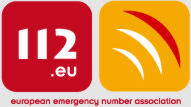The 112 was established in 1991 and it was consolidated in 2002 in the context of the Universal Service Directive of the EU (article 26). One expects Europe's politicians to work hard to provide an efficient, high quality pan-European emergency call number. That they would ensure the implementation of the legal obligations provided for in the Directive, namely that «calls to the 112 are appropriately answered and handled», that emergency services receive «caller location information ... for all calls to the 112» and finally that «citizens are adequately informed about the existence and use of the 112».
Today, more than 15 years since the establishment of the 112 in Europe, the situation is far from ideal. Only one in every three Europeans is aware of the existence of the 112, while the numerous false calls to the 112 prove that people know very little about the proper use of this emergency call number. The European Commission has opened a dozen infringement procedures against Member States that do not transmit caller location information to emergency services, something that could save some 5.000 lives annually (and help emergency services save 5 billion of euros). However, at least in two cases, information about the implementation of localisation transmitted by Member States to the Commission was false and this could mean that more infringement procedures may be necessary. Conserning quality standards for the answering and handling of calls, the Commission just does not address the issue at all, pretending it is a solely national responsibility. Go explain this to the 100 million European citizens who cross the internal borders of the EU every year for leisure or business ... (for more information on the problems with the implementation of the 112 see the petitions EENA lodged with the European Parliament).
Given this state of affairs, one would expect European politicians to abstain from the field of emergency call numbers altogether. After all, emergency services do not fall under the provisions of the EU Treaties (although protecting of citizens and human health does ...). But when politicians want to make the news in an easy way they will use all available means. That is why, instead of working for the improvement of the existing 112 number, the European Commission recently launched the 116 000 telephone number, a new single hotline number for reporting missing children. Of course, nobody could be against an initiative to help parents and relatives report a missing child and launch a pan-European alert. Parents who realise that their child is missing are entitled to the best possible support as soon as possible in order to locate their child. But was it necessary to create a new European emergency number when the 112 already exists and there is a firm legal basis for its improvement? Will the new 116000 number be equipped with caller location capabilities? Are calls to the new number to be appropriately answered and handled? What will be the cost for this new service compared to the cost of a better implementation of the 112?
According to available statistics some 70.000 children are reported missing in the EU every year. According to a World Health Organisation report entitled «Injury: A leading cause of the global burden of disease», heart attacks, cerebrovascular incidents, self inflicted injuries, falls, road accidents, poisonings, drowning and interpersonal violence provoke every year in the (high income) European region some 1.287.769 deaths and some 9.066.441 cases of injured (data for the year 2000). In most of these cases people would seek help by calling the emergency medical services. Unfortunetely we do not have EU-wide data for fires and police inreventions, that would have made these numbers still bigger.
This is why EENA believes that improving the 112 service chain would benefit ALL people who seek desperately for help INCLUDING parents or relatives who want to report missing children. If 70.000 missing children are to be considered (quite rightly) a priority, the millions of victims who everyday call (or do not call because they ignore) the European emergency call number, also deserve a high quality service. But of course it is easier to make the news on a highly emotional issue rather than deal with the bleak reality ...
Monday 29 January 2007
Quantity versus Quality
Posted by eena112 at 1/29/2007 08:18:00 pm
Subscribe to:
Posts (Atom)
